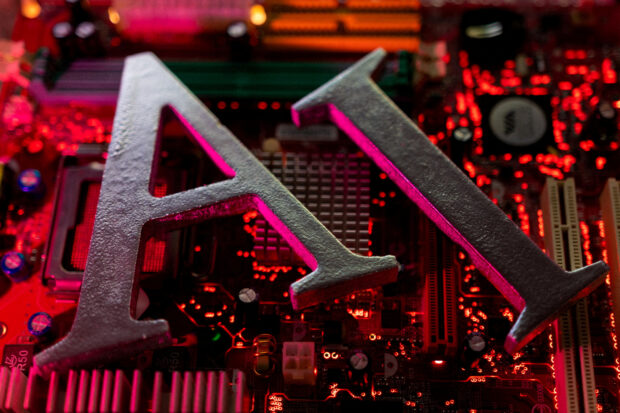AI (Artificial Intelligence) letters can be found on a computer motherboard, as depicted in this illustration taken on June 23, 2023. This unique image captures the essence of AI’s presence in our technological world.
Leading Swedish university Lund has implemented a system where teachers have the authority to grant students access to AI for assistance with their assignments. Similarly, the University of Western Australia in Perth has engaged in conversations with students regarding the benefits and challenges of using generative AI in their work. The University of Hong Kong has also allowed the limited use of ChatGPT, developed by Microsoft-backed OpenAI.
ChatGPT, launched on November 30, has rapidly become the world’s fastest-growing app, prompting the release of competitors like Google’s Bard. These AI tools, including ChatGPT, utilize language and data patterns to generate a wide range of content, such as essays, videos, and mathematical calculations, mimicking human work. This development has sparked discussions about revolutionary transformations across various fields, including academia.
AI’s ability to process information and data is highly beneficial, as it provides a foundation for in-depth critical analysis by humans. Leif Kari, Vice President for Education at Stockholm-based KTH Royal Institute of Technology, emphasizes that AI can assist students in tailoring course material to their individual needs, much like a personal tutor would.
Recognizing the significance of AI in education and academic research, the United Nations Educational, Scientific and Cultural Organization (UNESCO) has launched global guidelines for the responsible use of AI in these areas. These guidelines prompt national regulators to take steps in data protection and revision of copyright laws while ensuring that teachers acquire the necessary AI skills.
There is a debate among educators regarding AI’s similarities to hand-held calculators, which entered classrooms in the 1970s and sparked discussions about their impact on learning. Ultimately, calculators were widely accepted as invaluable learning tools. Similarly, concerns have been raised that students may excessively rely on AI and engage in cheating. The issue of copyright infringement arises when GenAI-produced content is presented as original work, raising questions about whether AI should be banned in academia. However, enforcing a ban seems impractical, and the focus should shift towards promoting learning instead of policing students, according to Rachel Forsyth, a project manager at Lund University.
For decades, Turnitin has been the main tool used to detect plagiarism worldwide. In April, they introduced an AI-powered tool to identify AI-generated content. While this detection tool has revealed that only a small percentage of students rely heavily on AI for their submissions, there have been instances of false positives where texts written by humans were mistakenly flagged as AI-produced. However, those wrongly accused can defend themselves by providing various drafts of their work.
Students themselves have been experimenting with AI, and some have expressed dissatisfaction, citing AI’s limitations in summarizing information at a basic level and its inability to discern fact from fiction or right from wrong. AI’s knowledge is restricted to what it scrapes from the internet, which may not suffice for specific inquiries.
The use of GenAI in education raises concerns about deepening societal divisions, as success becomes increasingly dependent on access to electricity, computers, and the internet, resources that the poorest may lack. UNESCO emphasizes the urgency of aligning the transformation of the education system with the pace of technological progress.
The European Union (EU) is at the forefront of AI regulations, with draft legislation that encompasses ethical guidelines that can potentially be applied to the use of AI in education. Following its departure from the EU, Britain is in the process of developing guidelines for AI use in education through consultations with educators.
Singapore, a leader in teacher training for AI implementation, is among the nearly 70 countries that have developed or planned strategies on AI. Kirsten Rulf, a partner at Boston Consulting Group, emphasizes the importance of leveraging AI in universities, developing responsible AI systems, and working with students to find effective mechanisms.
In conclusion, AI’s impact on education is an ongoing challenge, with educators striving to strike the right balance while integrating AI into the learning process. The future of AI in academia remains uncertain, but it is clear that its potential benefits and challenges must be carefully navigated to ensure equitable and effective education for all.
Denial of responsibility! Vigour Times is an automatic aggregator of Global media. In each content, the hyperlink to the primary source is specified. All trademarks belong to their rightful owners, and all materials to their authors. For any complaint, please reach us at – [email protected]. We will take necessary action within 24 hours.


